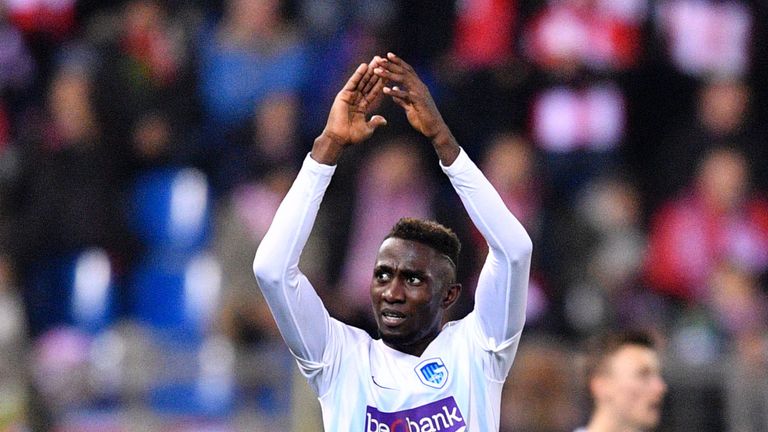Latest Sports News
Sports in Virtual Reality: A New Frontier

Latest Sports News
Top 16 Fastest Soccer Players Ever: Discover the Speed Demons of the Game
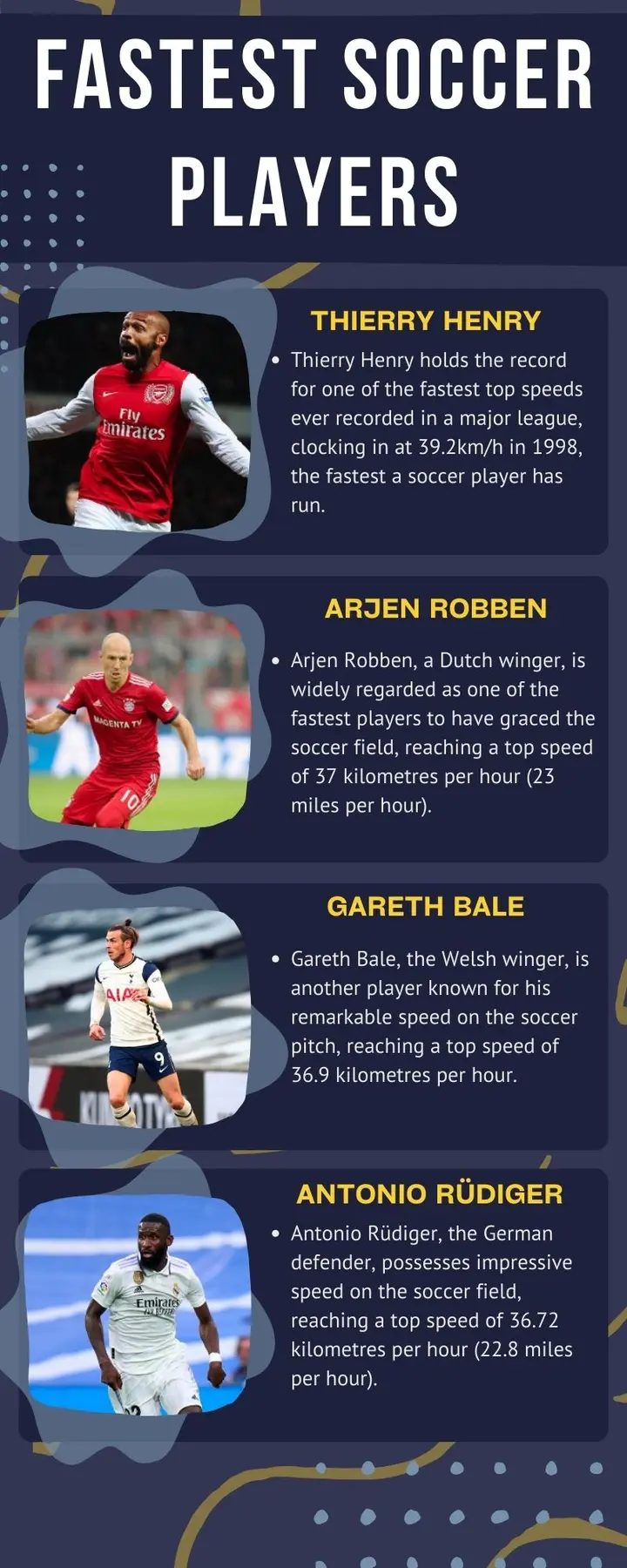
The quest for speed in soccer has always captivated fans and players. In the world of football, certain players are celebrated for their lightning-fast pace, setting remarkable speed records.
When we talk about the fastest soccer players ever, these elite athletes stand out for their extraordinary velocity and agility.
The 16 Fastest Soccer Players of All Time
Soccer history is filled with players who have demonstrated phenomenal speed on the field. Their incredible pace and technical skills have earned them legendary status.
Let’s dive into the list of the top 16 fastest soccer players and uncover who holds the title for the most blazing speed.
16. Cristiano Ronaldo – 33.95 km/h
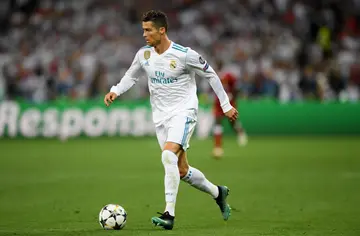
- Full name: Cristiano Ronaldo dos Santos Aveiro
- Date of birth: 5 February 1985
- Age: 39 years (as of 2024)
- Place of birth: Hospital Dr. Nélio Mendonça, Funchal, Portugal
Cristiano Ronaldo, a name synonymous with elite soccer, clocks in at a remarkable 33.95 km/h. Known for his explosive acceleration, Ronaldo has dazzled fans with his speed throughout his career with clubs like Manchester United and Real Madrid.
His ability to burst past defenders has made him one of the top fastest soccer players ever.
15. Antonio Valencia – 35.1 km/h
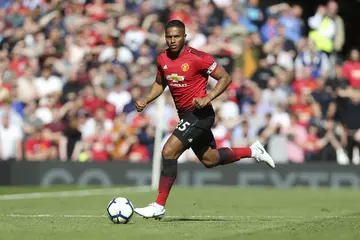
- Full name: Luis Antonio Valencia Mosquera
- Date of birth: 4 August 1985
- Age: 38 years (as of 2024)
- Place of birth: Nueva Loja, Ecuador
Antonio Valencia, the Ecuadorian winger, has been a notable figure in soccer for his incredible speed. With a top speed of 35.1 km/h, Valencia’s sprinting ability has been a crucial asset in both offensive and defensive situations.
His speed was particularly evident during his time at Manchester United, where he became renowned for his rapid runs down the wing.
14. Leroy Sané – 35.9 km/h
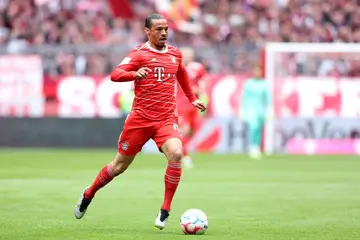
- Full name: Leroy Aziz Sané
- Date of birth: 11 January 1996
- Age: 28 years (as of 2024)
- Place of birth: Essen, Germany
Leroy Sané’s 35.9 km/h speed is a testament to his exceptional agility and acceleration. The German winger, known for his time at FC Bayern München, consistently leaves defenders in the dust.
His rapid pace allows him to create significant scoring opportunities, making him one of the most exciting players to watch.
13. Kylian Mbappé – 36 km/h
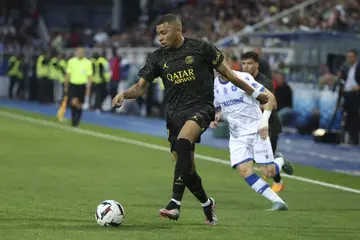
- Full name: Kylian Mbappé
- Date of birth: 20 December 1998
- Age: 25 years (as of 2024)
- Place of birth: 19th arrondissement, Paris, France
The French sensation Kylian Mbappé has taken the soccer world by storm with his astounding 36 km/h speed. Known for his blistering acceleration, Mbappé can outpace virtually any defender.
His ability to maintain such high speed over distances is a key factor in his success and reputation as one of the top fastest soccer players.
12. Ronaldo Nazário – 36.2 km/h
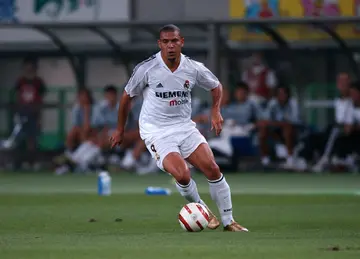
- Full name: Ronaldo Luís Nazário de Lima
- Date of birth: 18 September 1976
- Age: 47 years (as of 2024)
- Place of birth: Rio de Janeiro, State of Rio de Janeiro, Brazil
Ronaldo Nazário, often referred to as “El Fenomeno,” was renowned for his speed and skill. With a top speed of 36.2 km/h, the Brazilian legend’s rapid bursts left defenders struggling to keep up.
His exceptional speed, combined with his technical prowess, made him one of the most formidable attackers of his era.
11. Mohamed Salah – 36.64 km/h
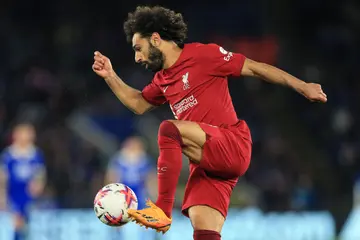
- Full name: Mohamed Salah Hamed Mahrous Ghaly
- Date of birth: 15 June 1992
- Age: 31 years (as of 2024)
- Place of birth: Nagrig, Egypt
Mohamed Salah, the Egyptian forward for Liverpool, has reached an impressive speed of 36.64 km/h. His electrifying pace is a vital component of his attacking game, allowing him to outrun defenders and capitalize on scoring opportunities.
Salah’s speed and technical ability make him a constant threat on the field.
10. Antonio Rüdiger – 36.72 km/h
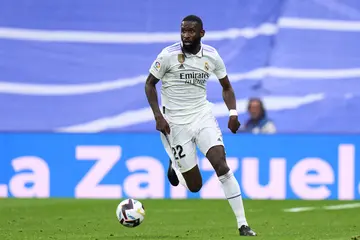
- Full name: Antonio Rüdiger
- Date of birth: 3 March 1993
- Age: 31 years (as of 2024)
- Place of birth: Berlin, Germany
Antonio Rüdiger, a German defender, showcases his impressive speed with a top speed of 36.72 km/h. His ability to accelerate quickly and cover ground efficiently has made him a valuable player for both Real Madrid and the German national team.
Rüdiger’s speed enhances his defensive capabilities, making him a key asset in crucial situations.
9. Dara O’Shea – 36.73 km/h

- Full name: Dara Joseph O’Shea
- Date of birth:4 March 1999
- Age: 25 years (as of 2024)
- Place of birth: Dublin, Ireland
Dara O’Shea, a defender for Burnley and the Republic of Ireland, boasts a top speed of 36.73 km/h. His speed allows him to keep pace with some of the Premier League’s most dynamic attackers.
O’Shea’s quickness and defensive skills have established him as a rising star in soccer.
8. Dominik Szoboszlai – 36.76 km/h
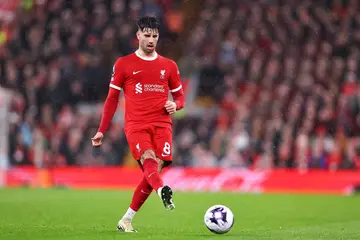
- Full name: Dominik Szoboszlai
- Date of birth: 25 October 2000
- Age: 23 years (as of 2024)
- Place of birth: Székesfehérvár, Hungary
Hungarian midfielder Dominik Szoboszlai reaches a top speed of 36.76 km/h. Playing for Liverpool and captaining the Hungarian national team, Szoboszlai’s speed is a significant asset in his versatile midfield role.
His quick bursts and agility are critical to his performance on the field.
7. Pedro Neto – 36.86 km/h
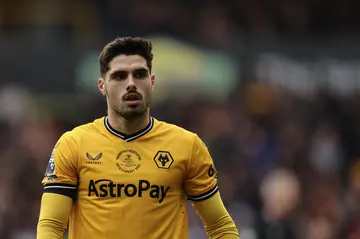
- Full name: Pedro Lomba Neto
- Date of birth: 9 March 2000
- Age: 24 years (as of 2024)
- Place of birth: Viana do Castelo, Portugal
Pedro Neto, the Portuguese winger for Wolverhampton Wanderers, has a top speed of 36.86 km/h.
Known for his rapid pace and dynamic play, Neto’s speed is a key factor in his ability to disrupt defenses and create scoring chances.
6. Gareth Bale – 36.9 km/h
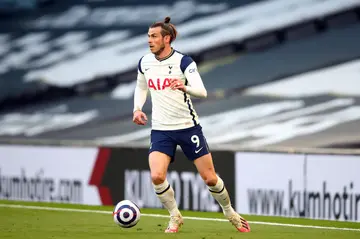
- Full name: Gareth Frank Bale
- Date of birth: 16 July 1989
- Age: 34 years (as of 2024)
- Place of birth: Cardiff, United Kingdom
Gareth Bale, the Welsh winger, achieved a top speed of 36.9 km/h. His speed has been a defining feature of his career, particularly during his time with Tottenham Hotspur and Real Madrid.
Bale’s explosive acceleration and rapid runs make him one of the fastest soccer players in history.
5. Chiedozie Ogbene – 36.93 km/h
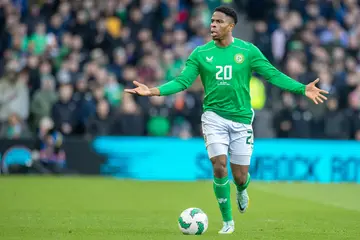
- Full name: Chiedozie Somkelechukwu Ogbene
- Date of birth: 1 May 1997
- Age: 26 years (as of 2024)
- Place of birth: Lagos, Nigeria
Chiedozie Ogbene, known for his impressive 36.93 km/h speed, has made a name for himself with his blistering pace.
His ability to cover ground quickly and maintain high velocity makes him a standout player on the field.
4. Arjen Robben – 37 km/h
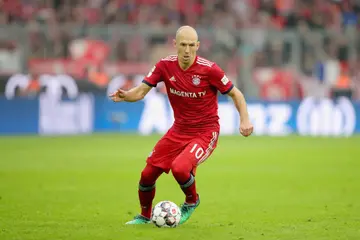
- Full name: Arjen Robben
- Date of birth: 23 January 1984
- Age: 40 years (as of 2024)
- Place of birth: Bedum, Netherlands
Arjen Robben, the Dutch winger, reached a remarkable top speed of 37 km/h. His incredible pace, combined with his technical skills, allowed him to be a constant threat to defenders.
Robben’s speed was a key factor in his success with clubs like Bayern Munich.
3. Kyle Walker – 37.31 km/h
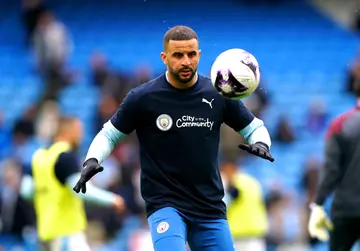
- Full name: Kyle Andrew Walker
- Date of birth: 28 May 1990
- Age: 33 years (as of 2024)
- Place of birth: Sheffield, United Kingdom
Kyle Walker, the English right-back, is known for his top speed of 37.31 km/h.
His ability to cover ground quickly and his defensive prowess make him a valuable player for both Manchester City and the England national team.
2. Micky van de Ven – 37.38 km/h
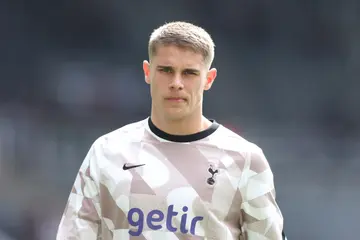
- Full name: Micky van de Ven
- Date of birth: 19 April 2001
- Age: 22 years (as of 2024)
- Place of birth: Wormer, Netherlands
Micky van de Ven, a Dutch defender, achieves an impressive speed of 37.38 km/h. His rapid pace and defensive skills make him a standout player in the sport.
Van de Ven’s speed is a significant asset in his role as a defender.
1. Thierry Henry – 39.2 km/h
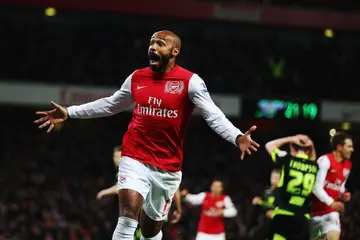
- Full name: Thierry Daniel Henry
- Date of birth: 17 August 1977
- Age: 46 years (as of 2024)
- Place of birth: Les Ulis, France
Thierry Henry, the French legend, holds the top spot with a phenomenal 39.2 km/h speed. Known for his explosive acceleration and incredible pace, Henry’s speed was a key factor in his success with Arsenal and other top clubs.
His ability to outpace defenders and create scoring opportunities solidifies his place as the fastest soccer player ever.
Conclusion
In the world of soccer, speed is a game-changer. The fastest soccer players not only entertain us with their breathtaking pace but also redefine the dynamics of the game.
From Cristiano Ronaldo’s explosive runs to Thierry Henry’s unmatched speed, these athletes have left an indelible mark on soccer history with their incredible velocity.
FAQs
1. Who is the fastest soccer player ever?
Thierry Henry holds the title of the fastest soccer player ever with a top speed of 39.2 km/h.
2. How fast is Kylian Mbappé?
Kylian Mbappé reaches a top speed of 36 km/h.
3. What is Cristiano Ronaldo’s top speed?
Cristiano Ronaldo’s top speed is 33.95 km/h.
Latest Sports News
“Brazil’s Gabi Nunes Clinches Narrow Victory Over Nigeria in Olympic Women’s Football”
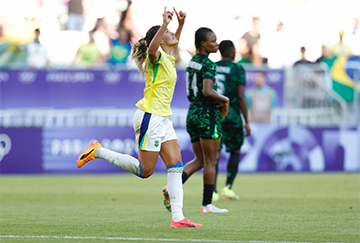
In a tense Olympic showdown, Brazil’s women’s football team edged past Nigeria with a 1-0 victory, thanks to a decisive goal from Gabi Nunes.
The match, held on July 26, 2024, as part of the Paris Olympics, showcased the fine margins that often define top-level football competitions.
Nunes, who found the back of the net in the 37th minute, expressed her elation post-match. “I am very, very happy with this game,” she told reporters, her voice brimming with enthusiasm. “It was a difficult game, but this team is amazing. We trained extensively to perform at this level.”
The goal came from a well-worked move, with Brazilian football icon Marta providing the assist. Marta’s influence on the game was palpable, having earlier had a goal disallowed for offside, underscoring the narrow margins of victory at this elite level.
Brazil’s triumph, while slender, provides a solid foundation as they progress in the tournament. The South American powerhouse now faces a formidable challenge in their next fixture against reigning world champions Spain on Sunday.
This match highlighted the growing competitiveness in women’s football, with Nigeria proving to be a tough opponent despite the loss. The African side’s resilience will likely be a talking point as the tournament progresses.
As the Olympic football competition heats up, all eyes will be on how Brazil capitalizes on this momentum. With a mix of experienced campaigners like Marta and rising stars like Nunes, they remain one of the teams to watch in Paris 2024.
Source: com/sport.
Latest Sports News
Ndidi Set to Rejoin Leicester City
-

 Blog7 months ago
Blog7 months agoTop 10 Sports Management Programs: Unlocking the Secrets
-

 Blog5 months ago
Blog5 months agoShould the Lakers Lose On Purpose? A Strategic Look at the NBA Play-In Game
-

 Sports7 months ago
Sports7 months agoTop 12 Highest-Paid Soccer Players in the World + Income!
-

 Sports7 months ago
Sports7 months agoWhat Game is Called the “Sport of Kings”? Unveiling the History and Rules
-

 Sports7 months ago
Sports7 months agoHow to Play Badminton + Badminton Rules EXPLAINED!
-
![Top 13 Serie A Scorers Of All Time! [+ History]](https://sportcasino.info/wp-content/uploads/2024/03/Screenshot-2024-04-13-at-10.40.34 PM-400x240.png)
![Top 13 Serie A Scorers Of All Time! [+ History]](https://sportcasino.info/wp-content/uploads/2024/03/Screenshot-2024-04-13-at-10.40.34 PM-80x80.png) Sports6 months ago
Sports6 months agoTop 12 Serie A Scorers Of All Time! [+ History]
-

 golf4 months ago
golf4 months agoHow Much Does the Winner of the 2024 PGA Championship Get?
-

 Rules of Sport7 months ago
Rules of Sport7 months agoAmerican Football Rules: A Comprehensive Guide + 10 Tips


